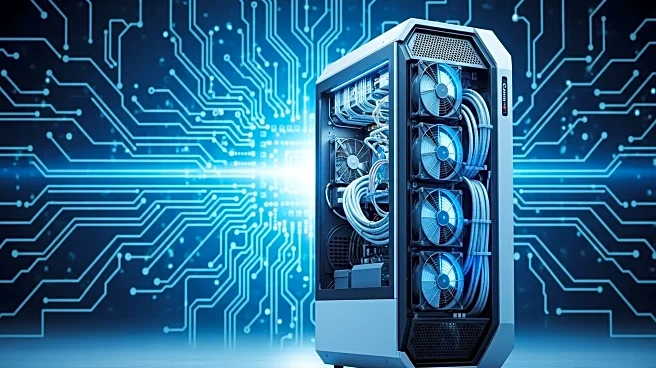What is the story about?
What's Happening?
Tesla has decided to shut down its ambitious AI supercomputer project, Dojo, which was initially developed to train neural networks for full self-driving technology. The project was a key component of Tesla's AI strategy, aimed at supporting robotaxis and autonomous humanoid robots. After six years of development, the Dojo team was disbanded in August 2025. This decision aligns with Tesla's strategic shift towards forming partnerships for chip development, exemplified by a $16.5 billion deal with Samsung for AI6 chips. The shutdown was influenced by the departure of key personnel, including Dojo's lead Peter Bannon and approximately 20 team members who have since founded DensityAI. Tesla is now focusing on Cortex, another AI training supercluster located at its Austin headquarters, indicating a move from high-risk, self-reliant hardware to a more collaborative approach in AI development.
Why It's Important?
The shutdown of the Dojo project marks a significant shift in Tesla's approach to AI development. By moving away from self-reliant hardware projects, Tesla is embracing partnerships that could enhance its technological capabilities and reduce risks associated with in-house development. This strategic pivot may impact the future of autonomous driving technology, as Tesla collaborates with industry leaders like Samsung. The decision could also influence Tesla's competitive position in the AI and autonomous vehicle markets, potentially affecting stakeholders such as investors, technology partners, and consumers interested in self-driving technology. The focus on Cortex suggests Tesla's continued commitment to AI innovation, albeit through a different strategic lens.
What's Next?
Tesla's next steps involve leveraging its partnership with Samsung to develop AI6 chips, which could play a crucial role in advancing its AI capabilities. The focus on Cortex at the Austin headquarters indicates ongoing efforts to enhance AI training infrastructure. Stakeholders, including investors and technology partners, will likely monitor Tesla's progress in AI development closely. The shift may also prompt reactions from competitors in the autonomous vehicle industry, potentially leading to new collaborations or innovations. As Tesla navigates this strategic transition, the impact on its product offerings and market position will be closely watched.
Beyond the Headlines
The shutdown of the Dojo project raises questions about the sustainability and risks of self-reliant hardware development in the tech industry. Tesla's move towards partnerships reflects a broader trend of collaboration in AI and technology sectors, where shared expertise and resources can drive innovation more effectively. This development may influence other companies to reconsider their strategies, balancing in-house projects with external collaborations. Additionally, the departure of key personnel to form DensityAI highlights the dynamic nature of talent movement within the industry, potentially leading to new startups and innovations.














